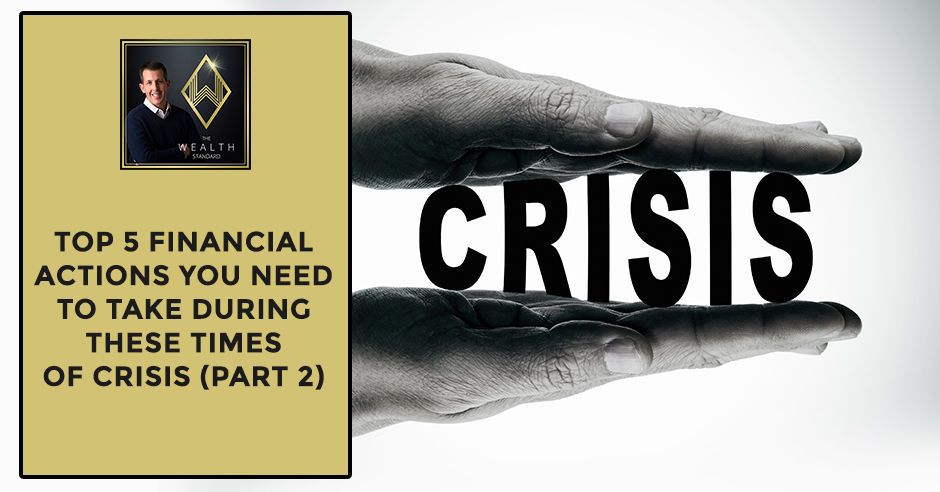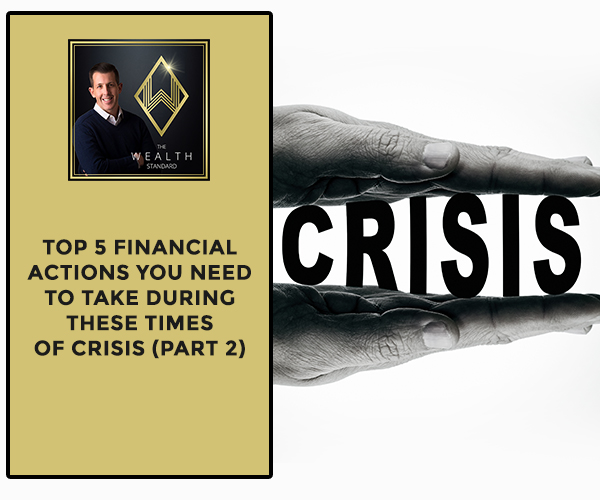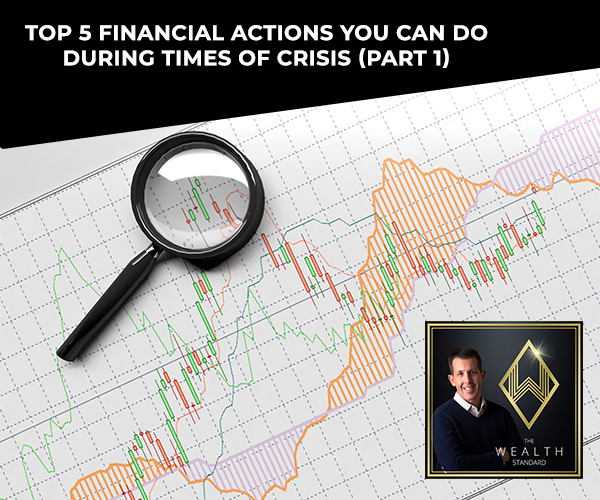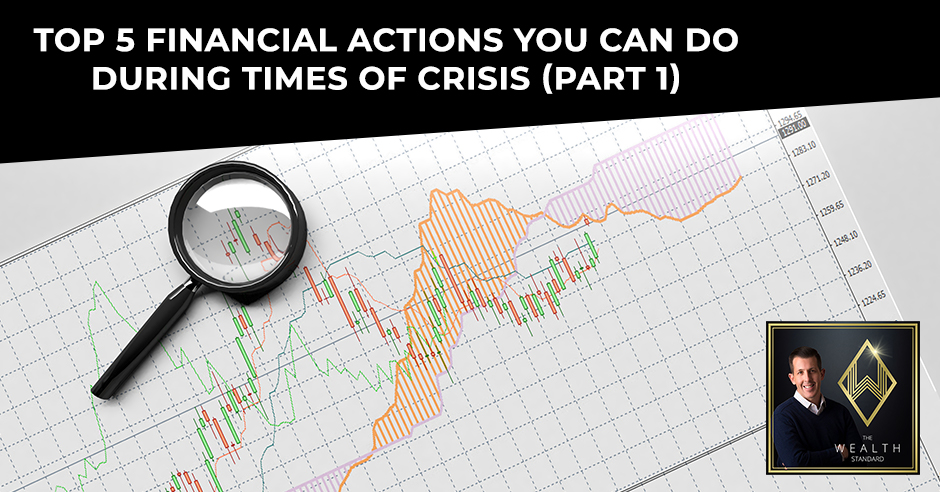Top 5 Financial Actions You Need To Take During These Times Of Crisis (Part 2)
Podcast: Play in new window | Download

While nothing in this world is ever permanent, the current situation we are living in is definitely more than the change we have been expecting to see. The COVID-19 situation is becoming more felt by the day, challenging our financial capacities. Continuing from the previous episode, Patrick Donohoe reveals the rest of the top five financial actions we need to take during these times of crisis. These times may be shocking, but why not use that shock to snap you out of the situation and be in a position to adopt some new habits and new behaviors that will undeniably come in handy in another unexpected crisis? It is prime time to do that, and Patrick helps you kickstart with this series.
—
Watch the episode here:
Listen to the podcast here:
Top 5 Financial Actions You Need To Take During These Times Of Crisis (Part 2)
Thank you for tuning into this part two episode of the Top Five Financial Actions to Take During Times of Crisis. I hope you enjoyed the previous episode. If you haven’t read it, definitely go back. It sets the stage for these more practical things to do. Go to TheWealthStandard.com, there’s a bunch of links as well as our Resources section of the website. I’m here doing part two, and this is where the rubber hits the road. For those of you who have been reading for a long time, I’m big being in the right mindset because I believe that is a precursor to the best decisions and the best actions to take, which ultimately leads to the best results. We live in very different times. We live in times that can throw us off-kilter and times that we’ll look back on and either celebrate for how much we benefited from them or on the contrary, we look back on times that destroyed us.
I go back to 2008, 2009 and I know families, people, and friends who have still not recovered, and this is years ago. Because they are telling themselves a story about what happened and why it happened. Typically, it relates to them. Not necessarily what they control, but it relates to the blame that they’re placing on others and also not using those circumstances to learn valuable lessons and do something about it. I believe these times are going to create those same exact two camps. The camps, the smaller one that capitalized on the environment, and then the one that tuck tailed, ran, blamed others, and played the victim.
I understand where people are at. I understand that there are so many that look at life happening to them, and that they should get this treatment, benefit, and people essentially serving them as opposed to them, figuring out how to properly serve others in order to serve themselves. That’s where I’m at. This episode is going to be interesting because we’re going to get into some very practical things. They’re things that very few people have done. I have had the opportunity to advise thousands and thousands of people and collectively with my team, more than that. We see the same things. It’s seldom we find these outliers and anomalies when it comes to how they manage their finances.
There are definitely signs of what has worked for people, will work for you. Now is the time to essentially use the shock that you’re getting based on what’s going on in the environment and use that shock to snap out of it and be in the position to adopt some new habits and new behaviors. It’s a prime time to do that. First was a state of mindset. Those two equations, state, stories, strategy, and principles, processes, products, in those sequence. Not executing a strategy until state and story is in line, and then not buying a product, creating a product if you’re an entrepreneur or business owner, or even like yourself as a product of service. It’s the principles first. What are the principles? Where’s their value? Where’s their exchange?
A salesperson is never going to tell you not to buy what he's selling. Click To TweetWhat’s the process that you use to deliver that? Finding those two out first, before you start to look at ways in which you can tweak the product, whether that’s yourself or something you buy as a product, investment product, financial product, or any other product. This comes down to the investment decisions that you make as well. It may be into a company that produces a certain product, but knowing the principle and knowing the process of that business is way more important than the product. Most people are infatuated by the product. That’s most important. State and mindset. The second is structure. It’s the routine that you established for yourself. Your morning, meditation, visualization, and spiritual routine. How you reach structuring your day using Craig Ballantyne’s Perfect Day Formula.
Another thing that I failed to mention in Part one is Tony Robbins’ Priming Exercise. These are ways in which you can establish your day. You don’t even have to think about it. It’s preprogrammed. You don’t have to spend energy on it. You commit and you do it. What that does is it positions you to make the right decisions and take the right action. The first action is cash and cashflow. The first thing is, you need to know where your expenses are. Know your money in, money out. There’s so much to buy these days that people are just that crazy about buying and subscribing to this little thing. Now is the time to slim down and trim the fat. There’s an awesome app that I use called You Need A Budget. It’s so simple and easy, so you know where your expenses are. Here’s what’s cool. You can start to use this app to figure out ways to reduce your expenses and to be frugal, which is going to be necessary.
The way in which we’ve consumed in the past is going to change. Supply chains are completely disrupted. You’re going to find that the goods that were expensive are cheaper than the goods that used to be cheap. Looking at how supply chains work, because of how clunky it is now, things are going to get stupidly expensive. I would do two things. Number one, you’re going to want to get a handle on where the money is coming from and where the money is going. Establishing that budget and then starting to trim down. The first thing I would do in trimming down is to prioritize because there may be some situations where you don’t have income for a couple of months. You need to know where to cut and what to cut. Instead of making a decision then, in the emotional frenzy, it’s determining what are the priority of your bills right now?
Going back to my 2008, 2009 experience, I prioritized my finances. I knew what I could get away with not paying and I knew what I had to pay. The biggest priority for me was my contributions. Contributing, whether it’s tithing or charity for you. The second thing became my family. It was the home we lived in and our transportation. I had a car repossessed during that time because we didn’t need two cars and there came a month where it came down to my priorities of bills and I chose those priorities, but I determined that in advance. I defaulted on quite a few business loans that I had because they weren’t a priority. Obviously, since then I paid everything back and got everything cleaned up from a credit standpoint, as well as the relationship I have with creditors, my credit score, and so forth. I’m fine now, but during those times of crisis, I had everything prioritized. Do that. Prioritize your bills. Know that if it came down to it, and you only could pay a few, which ones would they be? Knowing that in advance is huge.

Financial Actions: Sell stuff, get some capital, and donate.
It’s also a nice time to negotiate. This could be negotiation with your landlord. I’m doing that. The office space market is going to get hammered and cleaned out. I would be willing to bet that the way in which we office and work is going to completely change because of the experience of remote work. As well as having stringent finances and realizing that, “There’s a lot of expense that goes into my rent.” I have several months left of a seven-year lease on this building, which is a big building and way more space than I could ever use even when there are people here. We’re renegotiating because the lease is up and I know that then is going to be a different environment than now. I’m figuring out ways to cut there.
You also look at your cable bill and negotiating with that, finding new deals. I guarantee most service providers are figuring out ways to cut because so many people are canceling. They’re trying to figure out ways to discount this and discount that. If you don’t call, you’re not going to get it. They’re not just going to call you up and say, “We’d like to discount your internet bill, or we’d like to discount your phone.” These are times which you can start to negotiate, find deals, and cut your expenses, but still get the same services and goods.
Also, managing your credit. Most credit cards now give you a credit score for free so monitor that if you start to get credit dinged. This is going to be an environment where it’s going to happen potentially. You need to have the resources to be able to improve it. Lexington Law is a company that I’ve used personally for years and it’s an easy service. Most of it is automated and all online. This is also a time where I’ve seen some reports where you have a lot of people paying down credit. From a low credit standpoint, this is a time to not pay off your low-interest debt. I remember back in 2008, 2009, this is when banks were cutting credit lines like business credit lines and home equity credit lines. I had a big home equity line against my house and I drew 100% of it. I didn’t spend it but it’s in cash and it has a low interest.
I look at the banks closing that down, versus me having the cash and paying interest on it. I’m going to take the low interest on it every single day of the week. It’s going to position me for making better decisions and taking some action that I can take now that I may not have been able to take if I didn’t have access to cash. Evaluate your debts. If it’s a low interest, do not pay them down. Keep cash. Cash is way more valuable than paying off something that you can’t sell or getting the credit line completely cut and not being able to use it.
The time between depression and despondency is the ideal place to make a decision. Click To TweetAlso, check out TheOrganicPrepper.com. They have a whole section on their blog about being frugal. Where you can cut how to grow your own vegetables. A lot of ways in which you can learn to cook. There are some things that you can teach kids, start to study, and also find opportunities to have fun that don’t require going to Disneyland, Disney World, or a vacation. Also, start to understand bartering. This is going to be an environment where I would say trade is going to be way more prevalent than it had been in the past. If somebody needs this, you can provide that. I believe this is the time to look for those opportunities.
Those are three for cash and cashflow. You want to have cash. This is where the dry powder idea comes from, which is number four, financial actions. Keeping liquidity in areas that provide interest but are susceptible to being taken. With my other company Paradigm Life, we specialize in insurance products and how they play a role in personal finance. I have pretty much all my cash in these vehicles and in well over a dozen different insurance policies. Insurance companies are contractually obligated to lend you that money. It’s one of those circumstances where I know that I have a tremendous amount of dry powder so that when opportunities do present themselves, I can capitalize on those quickly.
I earn good interest on what the insurance company pays me as opposed to what a bank pays me. Diversify your liquidity. There are a lot of emotional decisions that go into buying metal like gold and silver. These are the crisis investments, the crisis assets, and I have a lot of gold and silver. If you don’t have any, I would definitely encourage you to look into that physically. Tom Dyson, who was a guest a few months ago is writing postcards from the fringe. He talks extensively about gold and its role in history as far as how it has been used as the benchmark for money and is continuing to do that during this crisis.
It’s an already established rule. Despite how digital things have gone, it is already an established habit that people have as far as what is safe during times of crisis. If there’s ever an end to the long-term debt cycle, which we talked about with the Richard Duncan episode. Gold is typically the place to be because most likely the new long-term debt cycle is going to start with potentially a new reserve currency. Who knows? It is one of those assets that you know is safe during times of crisis. Remember, you need to be smart about this. Consult with a wealth strategist and a financial advisor in order to make the right decision there.

Financial Actions; Right now, people are heightening their game when it comes to selling, so put yourself in that emotional state where you can operate the three sides of the coin: heads, tails, and the edge.
I would also separate your dry powder from your general expense account. Create a savings account. Create something that you have rules attached to. I have rules attached to three accounts that I have where no money is spent out of those accounts and they don’t pay bills. They don’t pay off a credit card. They are not used for any expenses. They are used for opportunity. Create some side account or repurpose an account you already have as your side account, your dry powder account. Sell things during this time. Donate them to charity and get the charitable deduction, or sell them. Facebook Marketplace. You have local classifieds that are still widely being used. I have a friend I used to work out with, and he works for a classified section of one of the local news organizations and they’re blowing up.
Number five is investments and assets. It’s going to be a really interesting time because I remember back 2008, 2009 so many people got into investments, this deal, that deal because they were so emotionally vulnerable. It was crisis, fear, “I’ll buy it.” “I’ll subscribe.” “I’ll do this.” I’m starting to see a lot of it especially when it comes to gold and silver. It comes down to the dollar as the reserve currency is going to end. The story there is so emotionally driven that it leads people to make poor decisions. I’ve made them in the past. I bought a ton of gold and silver, because of these things, and I realized that it probably wasn’t the best decision I could have made relative to the other decisions that I had. You’ve got to be smart here because the sales acumen of businesses is going to go up a lot.
I’m not saying that sales is bad, part of my business is sales. What I’m saying is that, people are heightening their game when it comes to selling. Be aware of that and put yourself in that emotional state where you can operate the three sides of the coin. Heads, tails, and the edge. A salesperson is never going to tell you not to buy what he’s selling. He’s always going to tell you to buy it. That’s one perspective. What’s the other perspective? Most people don’t go to the other perspective. Go to the other perspective. What would the opposite of what he is saying be? Who would say it? Find a person that is somewhat credible that is saying not to do whatever you’re being sold.
Now you have the two opinions, you can sit on the edge and make the best decision. That comes down to seeing both sides, getting more information, educating yourself and now you’ve positioned yourself to make the best decision. That’s one thing to be aware of. Also, I would revert back to this emotional cycle. During the times of euphoria, it’s the biggest financial risk that exists. The time between depression and despondency is the ideal place to make a decision. It’s right at the very bottom where everybody’s saying not to do something. Blood in the streets is often the quote that’s used. When there’s blood in the streets, even if it’s your own, that is when you should buy. That’s not right now. That’s why dry powder or liquidity is vital.
Deals happen in disruption. Click To TweetWe’re going to be going down through these emotional stages. Anxiety, denial, fear, desperation, and capitulation. “This investment is not for me, I’m getting out and never getting back in.” You’re going to see this. There’s so much money tied in the capital markets. There’s so much money in pension funds, 401(k)s and IRAs, it’s insane. There’s going to be a lot of selling because of what type of tsunami is going to hit. Whether it’s GDP, second-quarter earnings, or third-quarter earnings. It’s going to be crazy. At the same time, that’s one perspective. You’ve got to know the other perspective and when you sit on the edge, you can now analyze the additional information which is emotional states. That will help you start to buy in the right environments.
That’s where I would say a lot of the investments are going to come from. It’s during that stage, but at the same time, you know that I’m always big on business, that’s my biggest investment. I’m my biggest investment because I’m not meant to be a trader. I have a lot invested in real estate. I sold more than half of my real estate in 2019 because I knew we were in this bubble place. For me, I look at the biggest opportunity and it’s in business. That’s what I often communicate through this even though I do make investments. If you love investments and that’s a passion of yours, make it a side business of yours. That passion is going to give you information, expertise, and hopefully a lot of these ancillary things as far as your emotional state and the structure of things is concerned, the philosophical things and psychological things. That will help you be a better business person.
How I look at businesses is, leadership is number one. What leaders do is they serve. Whether you’re a leader or not, it doesn’t mean a leader in the formal terms, whether it’s a manager, an executive, or a director. I’m not saying that. Leader is an archetype, it’s a persona. That persona exists in you, it is inside of you. That king and warrior inside of you, male or female, it’s there. You just have to know what that is, identify it, and figure out how to bring it to the service you provide others. People gravitate toward leaders. They’re attracted by leaders. They follow leaders. Honing in those leadership skills allow you to leverage that, and then help and help a lot more people because doing it by yourself, is single-dimensional, and you’re only going to get a certain amount of output from that.
Make some investment in yourself even if it’s just time. Finding opportunities to serve and do it without the expectation of pay. If you think there’s something that would be valuable for a person, or valuable as a business, try to do it for free to see if it is valuable. Do more than what’s expected. Go out of your way to help people. Build and enhance relationships. These are things that don’t require any money but they do require the right state and mindset and also an identification of that leader inside of you. I would say this is a time that you’d want to double down. Do the things you’re most afraid of. Do the things that give you the most anxiety. Do the things that you were afraid to do in the past. Make the commitment and do it. The fear that exists is all mental. It’s all mental fear, but that experience will teach you some tremendous lessons and help you to identify opportunities, both in the short-term and in the long-term.

Financial Actions: If you can keep your head straight, keep yourself liquid, keep yourself lean, mean, and efficient, then you’re going to crush it.
Two more things when it comes to investments and assets. First, it’s the idea of asymmetric risk and reward. That’s where making small bets but getting huge upsides, or multiples of those bets. These are not the times that getting the standard long-term interest rate is relevant. Now is the environment to find deals. Deals happen in disruption. Don’t settle for small interest rates as far as your investments are concerned. Try to find the highest interest rates as it pertains to your tier one security guaranteed bucket. Your cash liquidity. When it comes from an investment standpoint, these are the times in which you can get multiples. You can get deals on them.
2010 was the best time after the financial crisis of 2008, 2009. Everyone said housing had crashed and nobody should get into the housing market. I got a few deals during that period of time. I know people that cleaned up because of buying during that time. Now’s the time that there’s going to be tremendous disruption and opportunities to make some good investments that give you this asymmetric risk-reward type of return. These multiple returns. Finally, it’s the identification of assets when it comes to cashflow. In the end, capital gains is going to become income. If you buy low and then sell high, that money is either going to be income or it’s going to have to go into another investment. Who knows what the investment environment is going to be then?
That’s where focusing on your tier two and tier three assets. As I talk about my book Heads I Win, Tails You Lose, these are assets that produce monthly or quarterly income. This is income that’s going to be consistent for a really long time. A perfectly leveraged income. Here is when more education and information is required on your part so you can make those right decisions. I’m not saying the capital gains isn’t necessary, but in the end, what gives true lasting wealth is income. Property values are going to tank, in my opinion. At the same time, those that bought for cashflow are going to be just fine. There’s maybe some slight disruption to rents but people need a place to stay. There could be some months between stimulus in responses by the government to help tenants and also help landlords where you may not get a month or two of rent.
At the same time, it’s going to be there especially if you bought in the right areas. Cashflow investments, there’s going to be a ton of those. There are always going to be people that have gotten in the game in the last couple of years, and it may not have been the right time. The reason why I sold my properties is I would never pay those prices for them. It was at such a high level and the cashflow wasn’t justifiable. The values were too high. I decided to sell. I don’t know if selling is appropriate, probably not. At the same time when it comes to the decisions you’re going to make in the years to come, that is where you want to get into investments that obviously produce a high amount of long-term cashflow as well.
That’s what I wanted to cover in this two-part series. These are some of the core financial decisions to make during times of crisis. I’m going to speak a lot to this as the months start to transpire, and the topics from guests as well. I believe that if you can keep your head straight, yourself liquid, lean, mean and efficient, you’re going to crush it. There’s a tremendous opportunity coming. I believe that if you guys continue to read, continue to implement what I’ve talked about, this is going to be a prime environment to establish personal wealth beyond your expectations and beliefs before. At the same time, you’re going to be able to help a lot of people. They’re going to need it. I mentioned tons of books, lists, graphics and terms. Make sure you also subscribe to the newsletter. Give me your feedback. I’d love to hear from you, Hello@TheWealthStandard.com. Thanks for reading. Thanks for your support. You guys are amazing and we’ll talk to you next time.
Important Links:
- Perfect Day Formula
- Priming Exercise
- You Need A Budget
- Lexington Law
- TheOrganicPrepper.com
- Paradigm Life
- Tom Dyson – Previous episode
- Richard Duncan – Previous episode
- Heads I Win Tails You Lose
- Hello@TheWealthStandard.com
Love the show? Subscribe, rate, review, and share!





















